ManageEngine vs. Freshservice: Which is the superior IT Service Management (ITSM) solution? If you’re making an ITSM tool comparison, you’ve come to the right place.
Organizations are constantly seeking ways to optimize their service delivery and enhance operational efficiency, and the choice of service desk software plays a crucial role in achieving these goals.
In this blog post, we’ll dive headfirst into the comparison between ManageEngine vs. Freshservice, two industry-leading contenders in ITSM. But there's more! If neither of these giants fully meets your requirements, we've got an alternative that might just be your perfect match: InvGate Service Management. This robust ITSM solution offers a compelling set of features designed to streamline your service delivery and empower your organization.
Buckle up and get ready for a help desk software exploration.

Table of contents
- TL;DR
- What is ManageEngine?
- What is Freshservice?
- Considering InvGate Service Management as an ITSM solution alternative
TL;DR
- ManageEngine is praised for its diverse product portfolio and high growth. At the same time, it has been said that its integrations beyond Zoho Ecosystem can be limited and there has been issues with vulnerabilities. In 2023, ManageEngine faced a notable setback with the discovery of two significant vulnerabilities across 24 of its products.
- Freshservice is valued for its ticketing, customer support, knowledge base, automation, and mobile app; but concerns arise regarding stability issues, limited reporting, pricing, customization, integration challenges, and search functionality.
- InvGate Service Management, on the other hand, provides streamlined ITSM setup, flexible deployment, robust ticketing and incident management, and self-service capabilities, emphasizing cost-effectiveness and innovation.
We tried to be as thorough as possible, but if you don't have enough time to read it through and through, here's (another) TL;DR: InvGate Service Management can do everything we say here, and you can test it right away for free for 30 days.
Most looked-at features by buyers
When assessing ITSM tools, prospective buyers typically consider critical capabilities that assist them in determining the solution that best suits their specific requirements and business needs. These factors hold substantial importance in the decision-making process. Let's delve into some of these crucial considerations.
- User experience and interface - Buyers prioritize platforms with a user-friendly interface that promotes intuitive usage, enhances user adoption, and boosts productivity. Additionally, organizations with remote or mobile workforces value mobile accessibility.
- Self-service and knowledge base - Self-service options are highly valued, enabling customers or employees to resolve common issues independently. A comprehensive knowledge base system with efficient search functionality, FAQs, and guides further enhances self-service capabilities.
- Scalability and customization - Organizations with evolving needs seek solutions that can scale alongside their growth and allow customization. The flexibility to create custom fields, workflows, and extensions is crucial in tailoring the solution to meet unique business requirements.
- Ticketing and Incident Management - Robust ticketing systems that facilitate effective handling, tracking, and prioritization of customer issues or incidents are sought after. Key features include ticket creation, assignment, tracking, SLA Management, and escalation workflows.
- ITIL compliance - Many organizations adhere to ITIL best practices for IT Service Management. Buyers may prioritize solutions that support ITIL processes, such as Incident Management, Problem Management, Change Management, and Asset Management.
- Streamlined IT service catalog - Organizations often require a service catalog that enables users to request specific IT services or resources quickly. This feature streamlines service requests, enhances visibility, and improves service delivery management.
- Automation and workflow efficiency - Efficiency gains through automation and workflow capabilities are highly valued. To save time and effort, buyers seek features like automation rules, SLA-driven workflows, approval processes, and seamless integration with other tools or systems.
- Integration and collaboration - Integration with other tools and systems, such as CRM, Project Management, or communication platforms, is crucial for streamlining workflows and ensuring data consistency. Collaboration features like internal communication, commenting, and mentions can enhance team productivity.
- Insightful reporting and analytics - Reporting and analytics capabilities are highly regarded for gaining insights into service performance, team productivity, customer satisfaction, and SLA compliance. Customizable dashboards and pre-built reports are essential for effective decision-making.
- Pricing and support - Buyers assess the solution's cost-effectiveness, including licensing models, subscription plans, and additional costs for features or users. The availability of reliable customer support, comprehensive documentation, and training resources also influence the decision-making process.
What is ManageEngine?
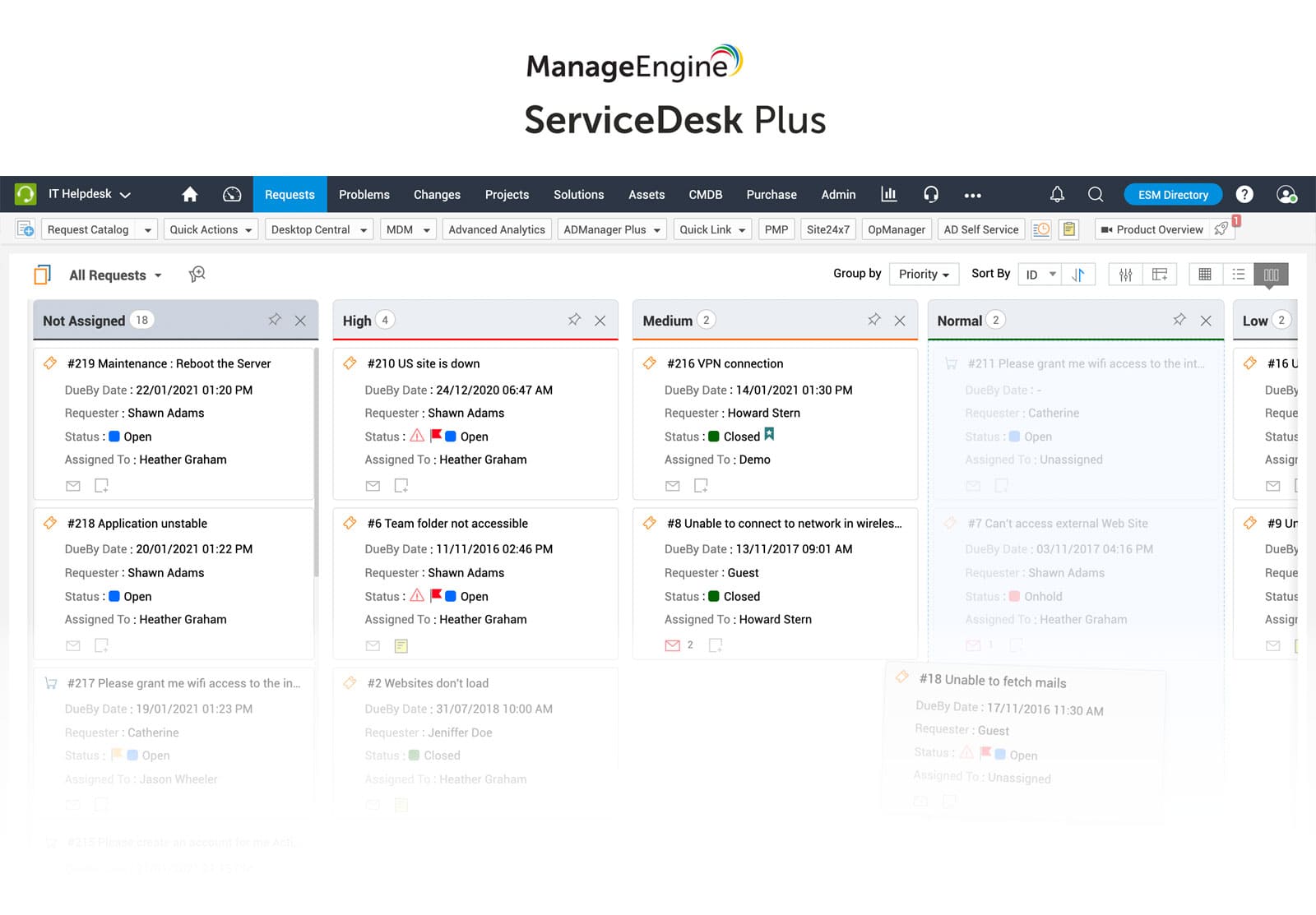
ManageEngine, previously known as AdventNet Inc., changed its name in 2009 and now operates as Zoho Corporation. It specializes in providing comprehensive IT Management solutions and primarily serves small to midsize businesses. The company is based in Pleasanton, California, and has a significant global presence, with more than 180,000 customers worldwide.
One of ManageEngine's main products is ServiceDesk Plus, a platform that offers cloud-based and on-premise deployment options. ServiceDesk Plus provides a wide range of capabilities, including IT Service Management (ITSM) and IT Asset Management (ITAM). In the Gartner Magic Quadrant, ManageEngine is recognized as a Challenger, indicating its strong competitive position in the market.
What users like from ManageEngine
ManageEngine has received customer recognition and acclaim, verified by reputable sources like Gartner. Let's explore some of the main advantages that customers have highlighted.
- Wide-ranging product portfolio - ManageEngine offers a comprehensive selection of complementary products that cover various areas, including endpoint management, network monitoring, application monitoring, and active directory management solutions. Leveraging the low-code development capabilities and line-of-business integrations provided by its parent company, Zoho, ManageEngine delivers a broad range of platform capabilities. This diverse portfolio enables opportunities for cross-selling and provides customers with added value.
- Impressive growth - ManageEngine has demonstrated strong potential for growth, as evidenced by its flexible deployment options and successful positioning in the midmarket segment. In 2021, the company experienced notable revenue growth and significantly expanded its customer base. Particularly, it has achieved substantial success in the enterprise sector, establishing itself as a rapidly expanding player in the industry.
- Competitive pricing - ManageEngine distinguishes itself through its competitive pricing strategy, offering highly cost-effective ITSM solutions. With multiple pricing tiers available, the platform caters to different budgets, making it an appealing choice for midmarket customers and larger organizations seeking value-oriented solutions.
What users don’t like from ManageEngine
While ManageEngine has many strengths and positive attributes, customers have expressed concerns and dislikes about certain platform aspects. These areas of customer apprehension have been identified through analysis of reputable sources like Gartner.
Let's explore some specific points that have raised customer concerns.
- Limited product innovation - ManageEngine focuses primarily on improving processes, integrations, and customization support rather than pushing the boundaries of product innovation. While the company has incorporated some AI/ML capabilities in areas such as field and template recommendations, it still falls behind more advanced products in this category.
- Restricted integrations beyond Zoho Ecosystem - The platform's integrations and extensibility are strongest when combined with other ManageEngine and Zoho ecosystem products. This may pose challenges for customers seeking seamless integration with popular ITOM tools outside the Zoho ecosystem, potentially requiring them to develop custom API connections.
- Unclear differentiation in ITSM marketing - ManageEngine's marketing efforts often fail to highlight its unique value proposition in the ITSM market effectively. By predominantly emphasizing common themes like low-code development, customer privacy, and deployment flexibility, the vendor struggles to set itself apart from more established competitors in the market.
- Security vulnerabilities - In 2023, ManageEngine faced a significant setback when two critical vulnerabilities were discovered across 24 products. These vulnerabilities were rated 9.8 out of 10 on the severity scale, as they could potentially enable remote execution of malicious code. However, the company promptly addressed the situation by releasing patches to mitigate the vulnerabilities and strengthen security measures.
What’s ManageEngine’s argument over Freshservice?
While Freshservice offers notable advantages, ManageEngine presents a compelling argument for organizations seeking specific strengths and benefits over its competitor.
Let's delve into the key areas where ManageEngine holds an edge over Freshservice.
- Comprehensive product portfolio - ManageEngine has a wide-ranging product portfolio that covers various areas beyond ITSM. With complementary solutions for endpoint management, network monitoring, application monitoring, and active directory management, ManageEngine offers a holistic suite of tools. Leveraging the low-code development capabilities and line-of-business integrations provided by its parent company, Zoho, ManageEngine delivers a diverse range of platform capabilities.
- Recognized growth and market presence - The company has demonstrated strong potential for growth, as evidenced by its flexible deployment options and successful positioning in the midmarket segment. With substantial revenue growth and an expanding customer base, ManageEngine has established itself as a rapidly expanding player in the industry, particularly in the enterprise sector.
- Competitive pricing strategy - ManageEngine distinguishes itself through its competitive pricing strategy. The platform offers highly cost-effective ITSM solutions, catering to different budgets with multiple pricing tiers. This approach makes ManageEngine an appealing choice for midmarket customers and larger organizations seeking value-oriented solutions that deliver comprehensive IT Service Management capabilities without breaking the bank.
- Emphasis on processes, integrations, and customization - ManageEngine focuses on improving processes, integrations, and customization support to meet the specific needs of organizations. It places significant importance on enhancing workflows, providing seamless integrations within the Zoho ecosystem, and offering extensive customization options. This approach allows organizations to align the ITSM solution with their unique business processes and requirements.
What is Freshservice?
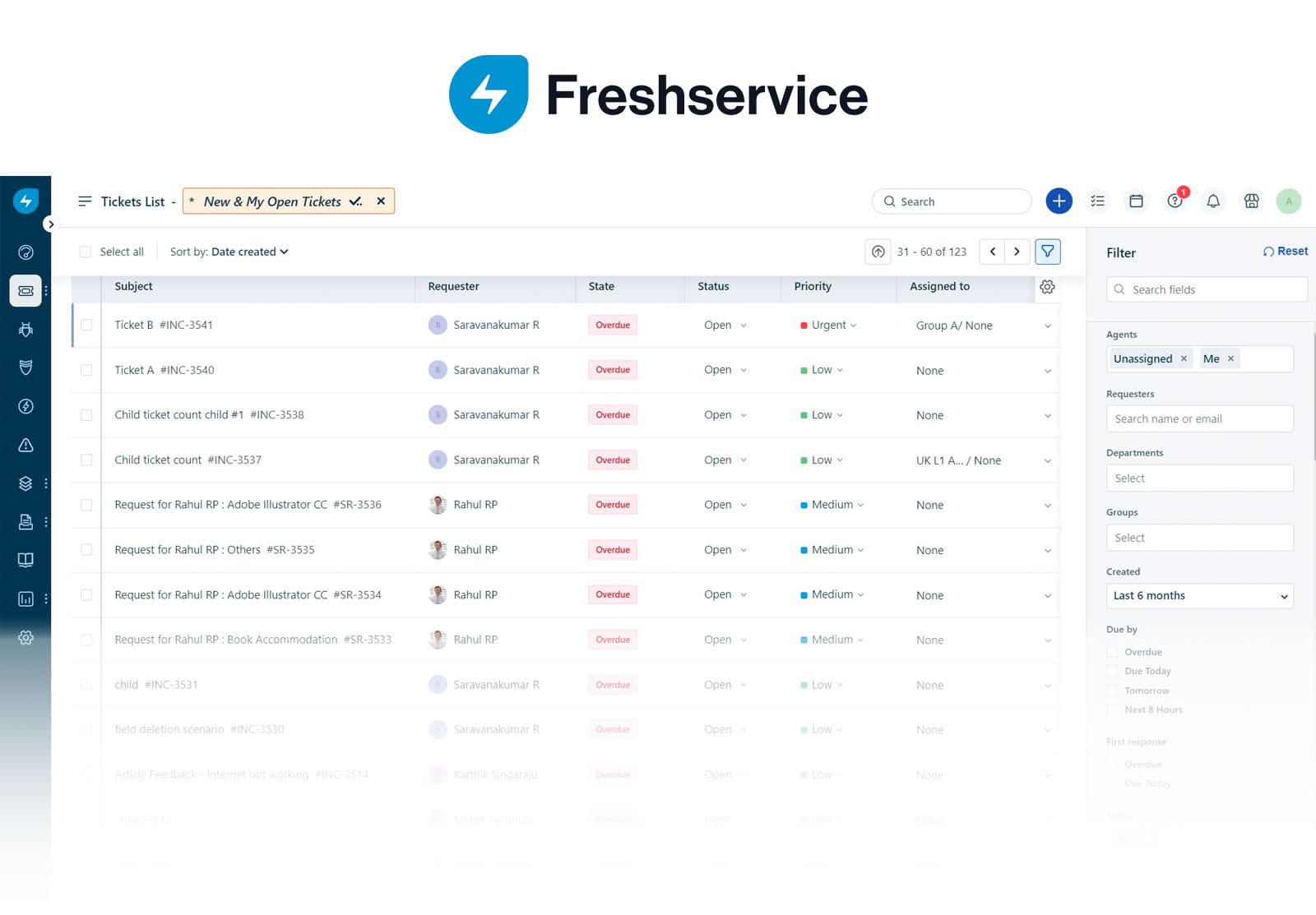
Freshservice is a cloud-based IT Service Management platform that is specifically designed to assist organizations of all sizes in efficiently managing their IT services. It offers a range of features, including IT Asset Management, incident and service request resolution, workflow automation, and a comprehensive knowledge base.
With its user-friendly interface and a high rating of 4.5 out of 5 from Gartner, Freshservice is a trusted solution for businesses looking to streamline their IT operations and provide exceptional service to their employees. It offers cloud-based deployment, allowing organizations to leverage the benefits of cloud computing.
Freshworks, the creators of Freshservice, established the company in 2010 and are headquartered in San Mateo, California, USA.
What users like from Freshservice
Freshservice has received positive customer feedback, as confirmed by reputable sources such as Gartner and G2. Let's explore some notable benefits of the platform.
- Robust knowledge base - The knowledge base feature is highly regarded as it empowers customers to find self-help resources and solutions.
- Intuitive user interface - Users appreciate the platform's interface for its simplicity and ease of use. It allows users to navigate effortlessly and perform tasks without confusion or complications.
- Effective ticketing system - The platform has garnered praise for its effectiveness in managing, tracking, and collaborating on tickets. It helps users efficiently handle and prioritize support requests, ensuring timely resolution and smooth communication.
- Automation and Workflow Management - Freshservice's automation capabilities have received positive user feedback. The platform streamlines processes and improves efficiency through features like workflows, automated responses, and escalations.
- Responsive customer support - The platform's customer support is widely acclaimed for its responsiveness and helpfulness. The knowledgeable support teams promptly address user concerns and provide assistance, delivering a satisfactory user experience and ensuring a smooth support journey.
- Convenient mobile app - Freshservice's mobile app is highly convenient for users requiring on-the-go access and ticket management. It provides a user-friendly experience similar to the web version, allowing users to efficiently handle support tickets remotely and ensure continuous support even while away from their desks.
What users don’t like from Freshservice
While Freshservice has many strengths and positive qualities, reviewing customer feedback from reputable sources like Gartner and G2 has highlighted particular concerns and dislikes about specific aspects of the platform. Here are some of the raised concerns.
- Limited customization - Users have expressed a desire for more customization options within Freshservice, particularly regarding ticketing workflows and interface personalization. They feel that additional flexibility in tailoring the platform to their specific needs would enhance their experience.
- A steep learning curve for advanced features - While users generally find the basic features user-friendly, some have reported difficulties navigating and utilizing the platform's more advanced features. They feel these advanced functionalities may require additional training or support to fully understand and utilize them effectively.
- Pricing structure - Some users have expressed concerns about the pricing structure of Freshservice, considering it expensive, especially when additional features or agent licenses are required. They feel that the cost may not align with the perceived value.
- Platform stability - Certain users have experienced stability issues while using the tool, including occasional system glitches, slow performance, and instances of downtime.
- Integration challenges - Users have encountered challenges when integrating Freshservice with third-party tools or systems. They have experienced difficulties in achieving seamless integration and have faced obstacles in connecting Freshservice with their existing software infrastructure.
- Limited reporting and analytics - Several users have mentioned that Freshservice's reporting capabilities could be improved. They feel that the current options are limited and would appreciate more robust reporting and analytics features to gain deeper insights into their IT Service Management processes.
- Search functionality - Some users have encountered difficulties with the search feature within Freshservice. They find that the search functionality is less effective in locating specific information or tickets, leading to frustration and inefficiency when trying to retrieve relevant data.
What’s Freshservice’s argument over ManageEngine?
While both ManageEngine and Freshservice are reputable ITSM solutions, Freshservice presents a compelling argument for organizations seeking specific advantages over ManageEngine. Let's explore some key areas where Freshservice outshines its competitor.
- Enhanced customization options - Freshservice provides an extensive range of customization options, allowing users to tailor ticketing workflows and personalize the platform's interface according to their unique requirements. This flexibility empowers organizations to align the ITSM solution more precisely with their specific processes and workflows.
- Intuitive, advanced features - Freshservice recognizes that certain advanced features may have a learning curve for users. The platform offers intuitive interfaces and user-friendly designs, making it easier for organizations to leverage and benefit from powerful functionalities that go beyond the basics.
- Flexible pricing and value - While ManageEngine offers competitive pricing, Freshservice strives to deliver exceptional value to customers. The platform's pricing structure is designed to align with the perceived value it provides, and additional features or agent licenses are transparently priced. Freshservice aims to provide a balance between affordability and comprehensive ITSM capabilities.
- Improved platform stability - Freshservice puts significant emphasis on platform stability, striving to minimize system glitches, slow performance, and instances of downtime. The platform undergoes regular maintenance and updates to ensure a stable and reliable user experience, reducing disruptions and enhancing operational efficiency.
- Seamless integrations - Freshservice acknowledges the importance of seamless integration with third-party tools and systems. The platform offers robust integration capabilities, enabling organizations to connect Freshservice with their existing software infrastructure more smoothly. This flexibility eliminates integration challenges and ensures a cohesive IT ecosystem.
- Expanded reporting and analytics - Freshservice recognizes the need for comprehensive reporting and analytics features. The platform aims to enhance its reporting capabilities, providing users with more extensive options and advanced analytics functionalities. This focus on data-driven insights allows organizations to gain deeper visibility into their ITSM processes and make informed decisions.
- Improved search functionality - Freshservice acknowledges the importance of efficient search functionality. The platform actively works to enhance its search capabilities, providing users with a more intuitive and effective search experience. This improvement ensures that users can quickly locate specific information, tickets, or relevant data within the platform.
Considering InvGate Service Management as an ITSM solution alternative

While ManageEngine and Freshservice are recognized competitors in the ITSM industry, exploring alternative solutions that align more precisely with your organization's unique needs is essential. In this context, InvGate Service Management is a compelling option that deserves thorough consideration. Let's delve into the advantageous features of InvGate Service Management that make it a valuable choice for fulfilling your organization's ITSM requirements.
1. Simplified configuration and setup
InvGate Service Management offers a streamlined configuration and setup process, leveraging a no-code/low-code approach. This concept allows new and experienced users to implement the system without requiring extensive technical expertise. The platform ensures a swift setup process by providing straightforward configuration options, allowing organizations to rapidly harness its powerful ITSM capabilities.
2. Customization and flexibility
InvGate Service Management offers flexible deployment options, allowing organizations to choose between on-premise or cloud-based solutions. This adaptability ensures that the platform can cater to the specific requirements of different sectors and industries.
3. Powerful Ticketing and Incident Management
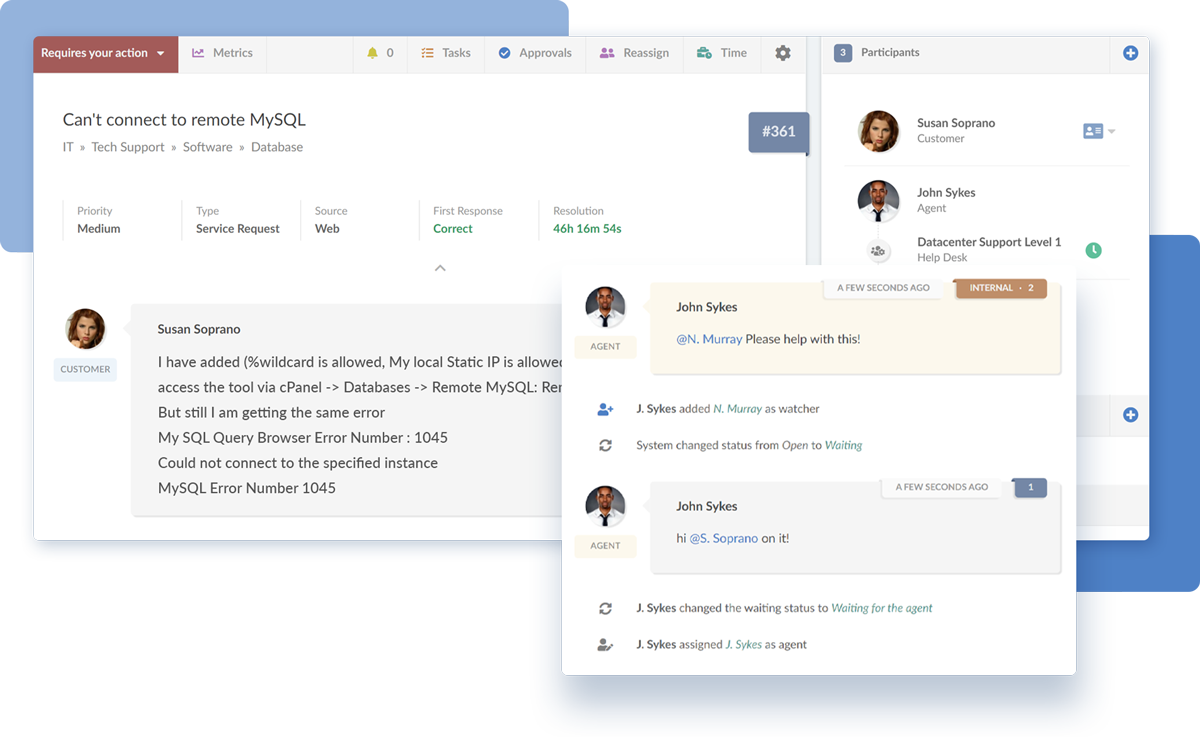
InvGate Service Management excels in robust features for Ticketing and Incident Management. It facilitates efficient tracking, collaboration, and resolution of tickets, empowering IT teams to handle and prioritize incidents effectively. With features such as automated routing, customizable workflows, and SLA Management, InvGate Service Management enhances the efficiency of incident resolution processes.
4. Exceptional user experience
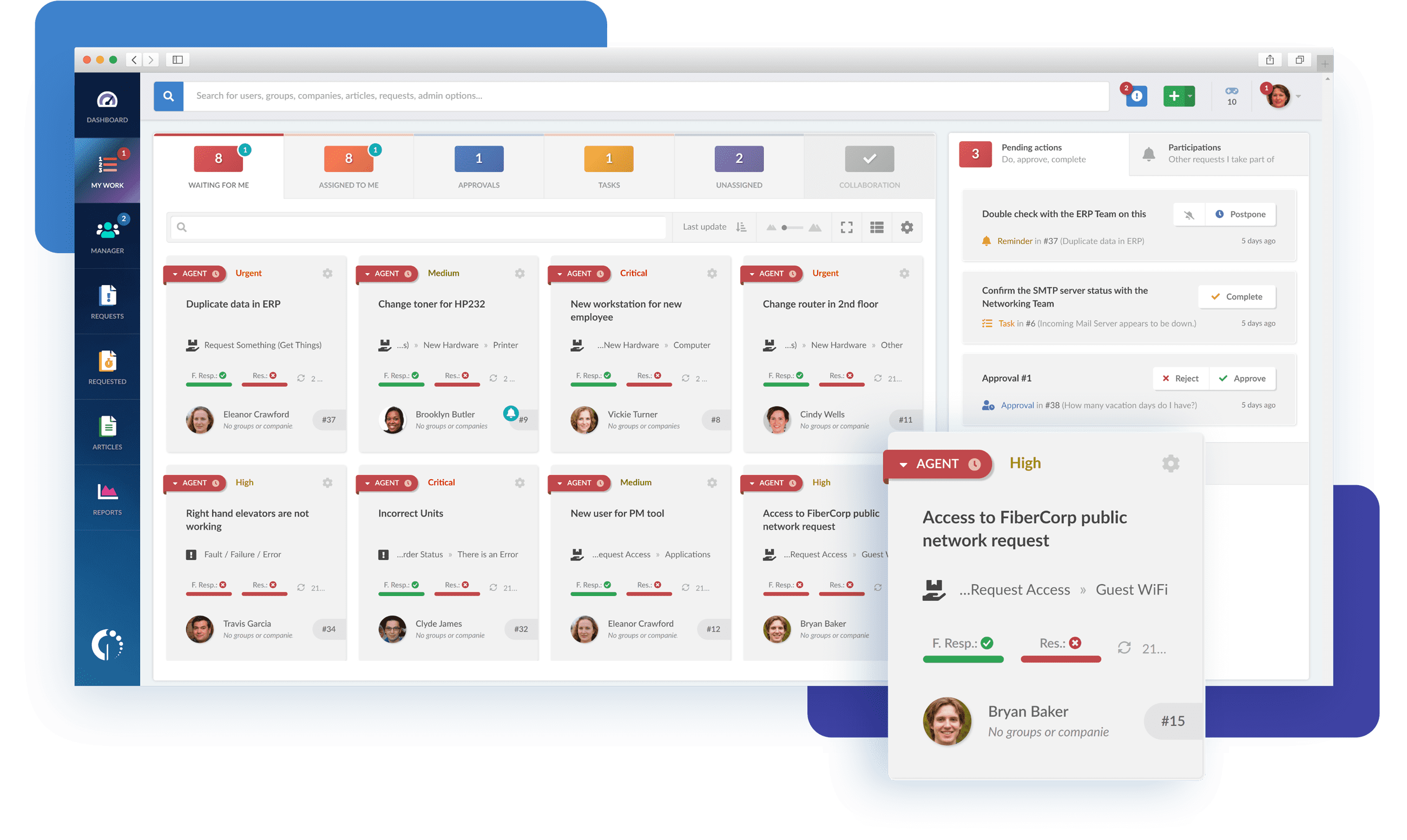
InvGate Service Management prioritizes delivering an outstanding user experience through meticulous design and adherence to UI/UX best practices. Its intuitive interface promotes quick adoption, reducing the need for extensive training and enabling users to be productive.
5. Robust self-service capabilities
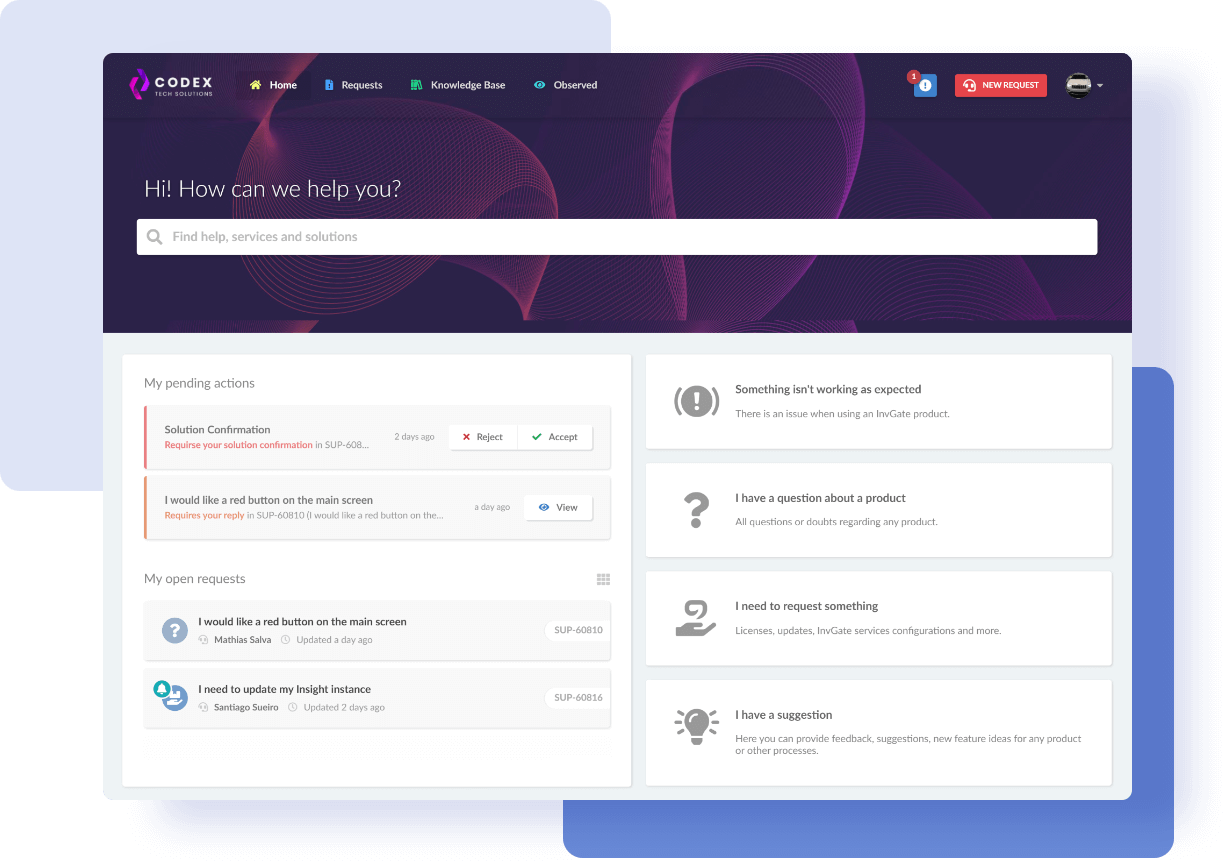
InvGate Service Management includes robust self-service functionalities, such as a user-friendly portal, an extensive IT service catalog, and a knowledge base. These capabilities empower end-users to independently resolve common issues, access a wide range of IT services, and utilize self-help resources, reducing the burden on IT staff.
6. Comprehensive Asset Management
By integrating InvGate Service Management with InvGate Asset Management, organizations gain a holistic view of their IT ecosystem, leading to improved service delivery and reduced downtime. InvGate Asset Management offers a range of features, including IT Asset Discovery, Inventory Management, Software License Management, and maintenance schedules.
7. ITIL-certified readiness
InvGate Service Management has obtained the esteemed ITIL4 certification from PINK Elephant, showcasing its dedication to upholding ITSM excellence. Whether organizations are starting their ITIL journey or managing complex operations, InvGate Service Management offers a user-friendly and feature-rich experience that aligns with industry best practices.
8. Born for ITSM, perfect for ESM
InvGate Service Management is purpose-built for ITSM while seamlessly extending its capabilities to Enterprise Service Management (ESM). It empowers operational departments to improve their processes and fully embrace the benefits of digital transformation. With a primary focus on ITSM and strong performance in ESM, InvGate Service Management facilitates streamlined workflows and comprehensive digital transformation initiatives across all departments.
9. Extensive reporting and analytics
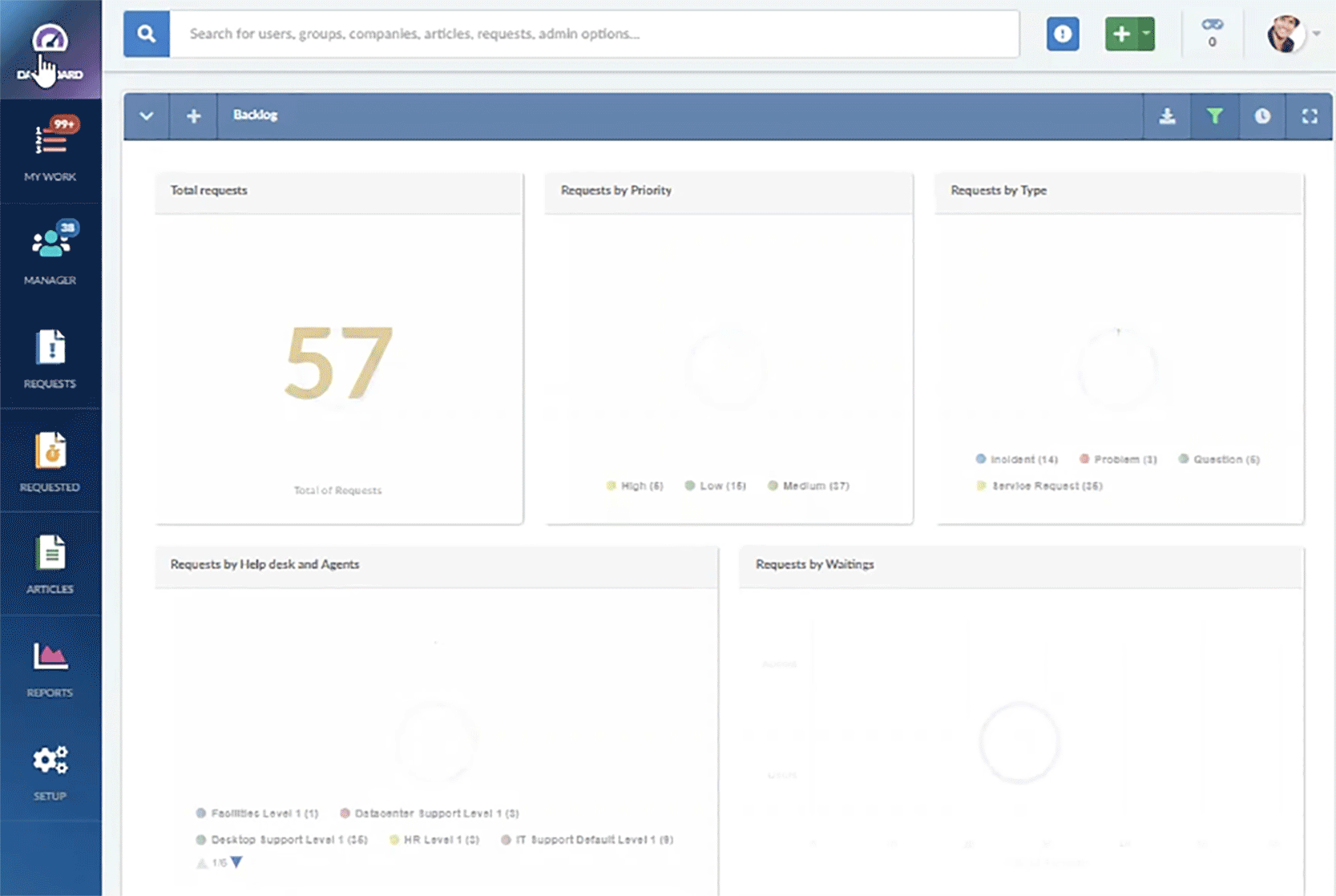
InvGate Service Management provides comprehensive reporting and analytics functionalities, enabling organizations to gain valuable insights into their IT operations and performance. The platform offers ready-to-use reports and customizable dashboards, empowering IT teams to analyze data, identify patterns, and make informed decisions to enhance their services.
10. Cost-effective solution
InvGate Service Management provides a cost-effective solution without compromising functionality. It offers a comprehensive range of ITSM features at a competitive price, making it an appealing choice for organizations seeking affordability without sacrificing capabilities. Compared to alternatives like ManageEngine and Freshservice, InvGate Service Management strikes a balance between cost and functionality.
11. Fast ROI and ongoing innovation
InvGate Service Management ensures a fast return on investment through efficient implementation processes. Within weeks, organizations can begin reaping the benefits of this robust ITSM solution. Additionally, regular feature updates keep users at the forefront of technology without incurring additional costs.
Next steps
Choosing the right ITSM solution is a critical decision that can significantly impact your organization's IT services and overall efficiency. You can select a solution that meets your needs and goals by carefully evaluating your choices.
Explore our live demo to witness firsthand how InvGate Service Management can enhance your business operations. If you have any questions, schedule a meeting with our experts for further clarification.
















